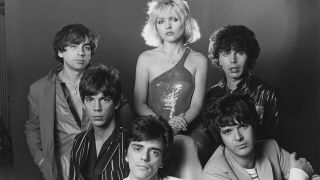“Every night after work we’d go to Studio 54, which was disgusting, this completely debauched atmosphere”: the inside story on the wildest, chaotic and most successful chapter of Blondie’s career

Blondie blew up big with a trio of masterful albums in the late 70s and early 80s, knocking out the hit-laden Parallel Lines, Eat To The Beat and Autoamerican in a quickfire two years between 1978-80 that made them huge. But their recipe for success was quite a particular one, basically one that can be boiled down to loads of drugs, loads of arguments, a flying keyboard here and there, and a producer trying to keep it all in check.
As the band told renowned writer Simon Goddard in an interview for Q Magazine a few years ago, the recreational narcotic side of things were a little out of control. “We did way too many drugs,” said guitarist and songwriter Chris Stein. “Everyone was doing fucking tons of cocaine and that was considered OK. But if you were doing heroin that was like, ‘I can’t talk to you anymore!’. There was a big line drawn and it all got very weird.”
Weirder still is that some of their most defining and enduring hits came out of such a wild period. Mike Chapman was in the producer’s chair and he thought of the turmoil as an added secret ingredient. “The chaos was responsible for a lot of the magic,” he said, comparing it to his work with British glam-rockers The Sweet earlier that decade. “They were always like, ‘Fuck you Chapman!’, but out of that aggression came The Ballroom Blitz. It was the same with Blondie on Parallel Lines. Each song was an event.”
That was the album that birthed the band’s first UK and US Number 1 in the heady, blissful grooves of Heart Of Glass, the album also going to Number 1 and becoming the UK’s biggest selling album in 1979. It began a purple patch that continued with follow-up Eat To The Beat, released the same year. But that album’s creation made Chapman realise he needed to get the hard-partying group away from New York.
“The more money they had, the more drugs,” the producer recalleld. “After the success of Parallel Lines, things started getting fucked up. That was when Jimmy [Destri, keyboardist] picked up a synthesiser and hurled it at me. It hit the floor and smashed – $35,000 worth of machinery just went boom! Then every night after work we’d go to Studio 54 which was disgusting, this completely debauched atmosphere. We were all doing the wrong drugs, we were all fucked up. It was killing us.”
Chapman convinced the band to up sticks for their next record, getting them out to LA to make 1980’s adventurous and suitably sun-drenched Autoamerican and momentarily saving them from themselves. New York would eventually beckon them back again. But Debbie Harry told Goddard that she didn’t think their pharmaceutical habits were the real issue.
“I don’t think that drugs were the real problem in Blondie,” she opined. “We’d worked years without a vacation, we were expected to produce a huge amount of material, we didn’t have proper management and we had a bad record deal. I mean, how much can one take?”
Harry and her bandmates were about to find out – within a few years, Blondie were no more, left dormant until reforming in the 90s. But what a run they had, crafting three classics amidst all the chaos.
